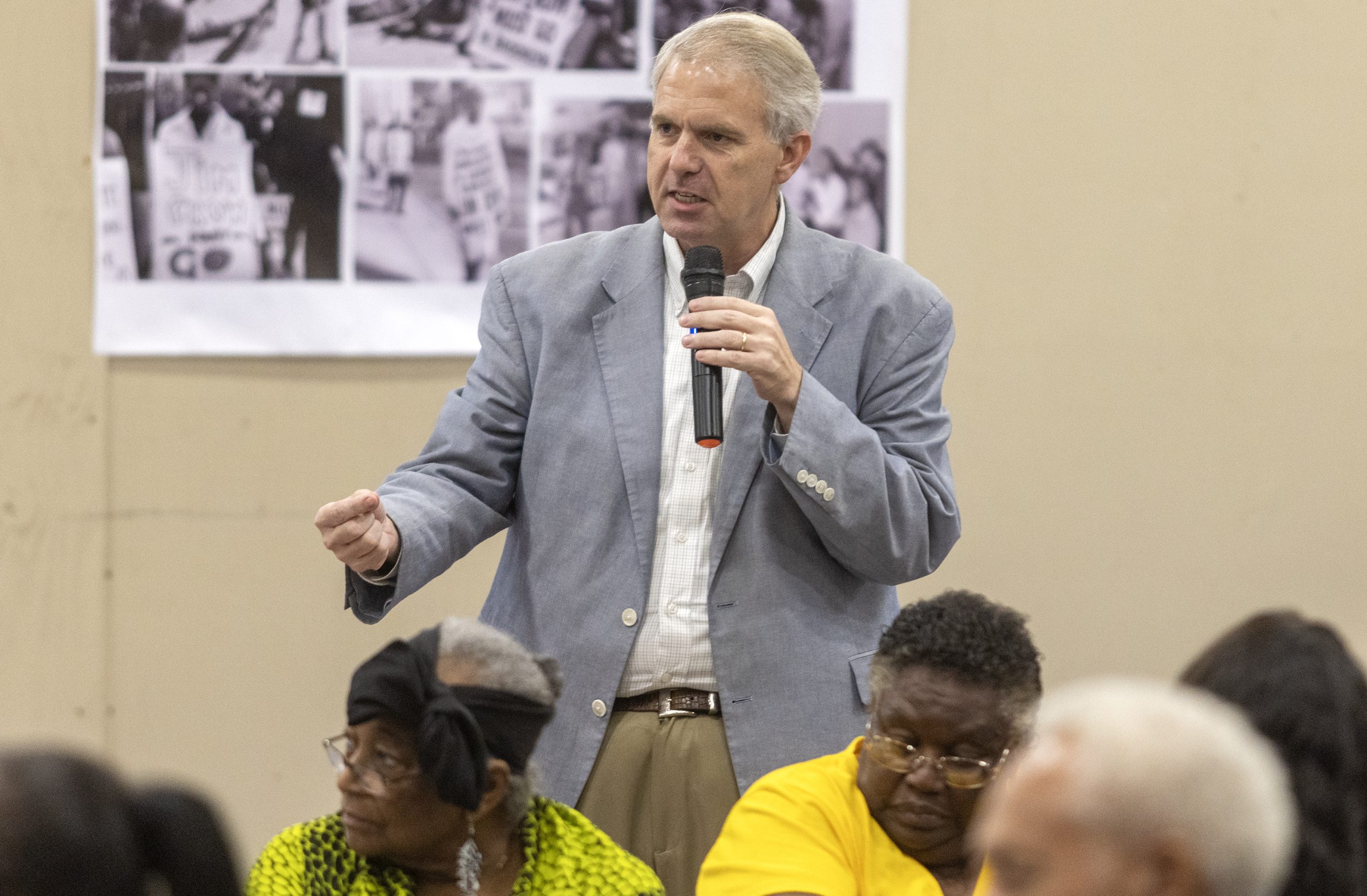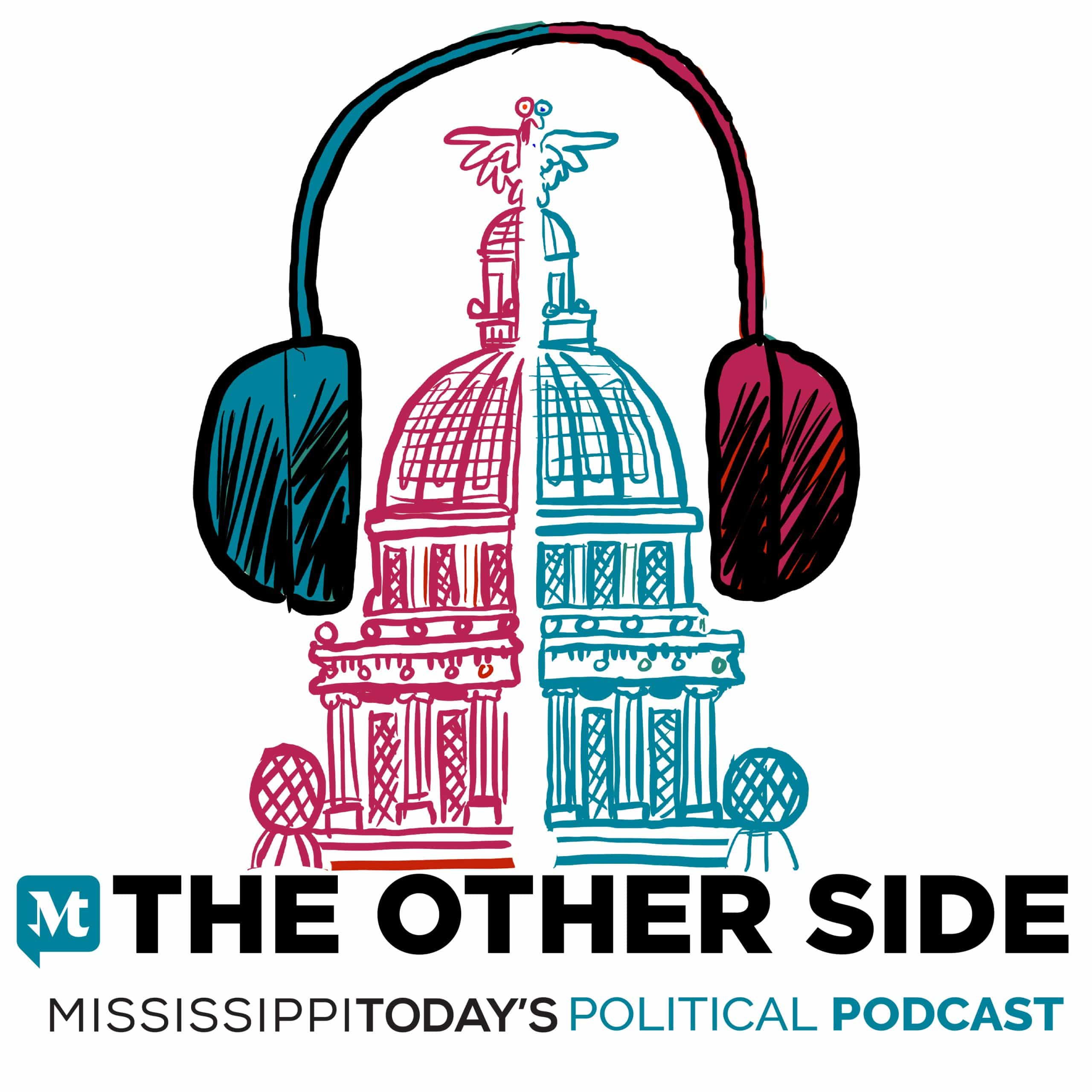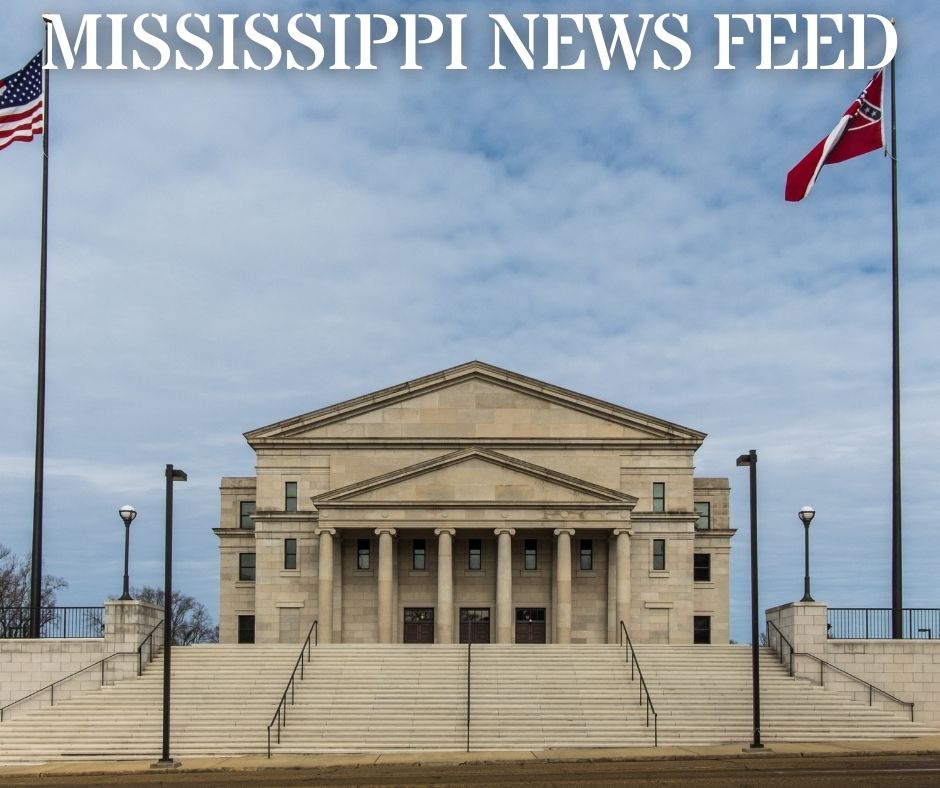Mississippi Today
It’s official: Democrat Brandon Presley fulfills promise to campaign in all 82 counties

Welcome to The Homestretch, a daily blog featuring the most comprehensive coverage of the 2023 Mississippi governor's race. This page, curated by the Mississippi Today politics team, will feature the biggest storylines of the 2023 governor's race at 7 a.m. every day between now and the Nov. 7 election.
Democrat Brandon Presley made a promise in early May that surprised even some people who advised his campaign: He would visit all 82 Mississippi counties during his campaign for governor.
It's not difficult to figure why a campaign adviser may groan at the vow. Mississippi has a ton of counties. Though we have the 32nd-most land area of any state in the nation, we rank 16th for total number of counties.
There are the easy ones to check off the list, like areas home to major population centers or places you have to drive through to get somewhere else. But in this rural and remote state, there are some counties you really have to make plans to visit. Take Wayne County in southeast Mississippi, for instance, which doesn't have a major U.S. highway. Same deal with Smith County in central Mississippi or Calhoun County in northeast Mississippi. And you sure have to be committed to the quest to hit Issaquena County, where just 1,300 people live.
Well doubters be damned — by the end of today, Presley will have reached all 82 counties after stopping in Amite and Wilkinson counties in southwest Mississippi.
The feat has certainly been done before, but very few Mississippi politicians can claim they visited all 82 counties during one single statewide campaign. But for Presley, this isn't about the novelty or just getting to say he did it. It's a mission that was aligned with a campaign strategy he's been rolling out since the day he announced his gubernatorial candidacy in January.
“I'm not just going to come to these counties during campaign years,” Presley said in a statement. “As governor, I'm going to come to continue visiting all 82 counties because Mississippians deserve a leader who will listen and meet them where they are.”
Gov. Tate Reeves, meanwhile, may not reach all 82 counties this year, but he has also been absolutely tearing up the campaign trail. He spent Monday in north Mississippi, Tuesday in the Delta, and Wednesday in the Pine Belt. The past few weeks, he's obviously upped his campaign road time.
It is, after all, the homestretch of the campaign cycle — when rubber meets the road, when you put pedal the metal (or insert your own cheesy road-related metaphor).
Headlines From The Trail
Beware: National reporters, here to cover Mississippi governor's race, are out for blood
Democrat's ‘uphill climb' to governor's office runs through rural Mississippi
Fact Check: No, Brandon Presley doesn't support gender surgeries for children
Gov. Reeves used state plane for Mardi Gras party and family trip to coast
Competitive gubernatorial stretch run still favors GOP incumbent Gov. Tate Reeves
Republicans hope Landry's Louisiana win bodes well for governors' races in Mississippi, Kentucky
WAPT helping Mississippi voters make a more informed choice for governor
Only hope for legislative Democrats in November: ending Republican supermajorities
What We're Watching
1) Will the company that sent the Reeves campaign a cease-and-desist letter actually file suit? The Reeves campaign's TV ad that a Tennessee-based solar energy company says is defamatory is reportedly still airing statewide. An attorney representing the company wrote in the cease-and-desist letter that his client “will pursue all available legal remedies” if the ad wasn't immediately removed from air. The Reeves campaign doubled down on the ad in response, and several Mississippians report on social media that the ad is still airing as of Oct. 18.
2) Presley's “empty chair October” tour continues. After he stops in those last two counties in southwest Mississippi on Thursday, the Democratic nominee will participate in an NAACP forum in Natchez. Reeves was invited to participate in the forum but declined. Presley's take on Wednesday: the governor “is hiding because he is afraid to face Misssippians.” Remember, Reeves criticized Presley earlier this month for agreeing to the NAACP forums.
3) Do the campaigns have any “October surprises” in store? The homestretch is usually when campaigns unload their opposition research. Major scandals, campaign trail gaffes, and other PR problems for candidates tend to bubble to the surface around this time in a cycle. What might we see in the coming days?
This article first appeared on Mississippi Today and is republished here under a Creative Commons license.
Did you miss our previous article…
https://www.biloxinewsevents.com/?p=297309
Mississippi Today
Podcast: The controversial day that Robert Kennedy came to the University of Mississippi

Retired U.S. Bankruptcy Judge Edward Ellington talks with Mississippi Today's Bobby Harrison and Geoff Pender about former U.S. Attorney General Robert Kennedy's speech at the University of Mississippi less than four years after the riots that occurred after the integration of the school. Ellington, who at the time headed the Ole Miss Speaker's Bureau as a law school student, recalls the controversy leading up to the speech.
This article first appeared on Mississippi Today and is republished here under a Creative Commons license.
Did you miss our previous article…
https://www.biloxinewsevents.com/?p=359978
Mississippi Today
On this day in 1961
MAY 20, 1961

A white mob of more than 300, including Klansmen, attacked Freedom Riders at the Greyhound Bus Station in Montgomery, Alabama. Future Congressman John Lewis was among them.
“An angry mob came out of nowhere, hundreds of people, with bricks and balls, chains,” Lewis recalled.
After beating on the riders, the mob turned on reporters and then Justice Department official John Seigenthaler, who was beaten unconscious and left in the street after helping two riders.
“Then they turned on my colleagues and started beating us and beat us so severely, we were left bloodied and unconscious in the streets of Montgomery,” Lewis recalled.
As the mob headed his way, Freedom Rider James Zwerg said he asked for God to be with him, and “I felt absolutely surrounded by love. I knew that whether I lived or died, I was going to be OK.”
The mob beat him so badly that his suit was soaked in blood.
“There was nothing particularly heroic in what I did,” he said. “If you want to talk about heroism, consider the Black man who probably saved my life. This man in coveralls, just off of work, happened to walk by as my beating was going on and said ‘Stop beating that kid. If you want to beat someone, beat me.' And they did. He was still unconscious when I left the hospital.”
To quell the violence, Attorney General Robert Kennedy sent in 450 federal marshals.
This article first appeared on Mississippi Today and is republished here under a Creative Commons license.
Mississippi Today
2024 Mississippi legislative session not good for private school voucher supporters
Despite a recent Mississippi Supreme Court ruling allowing $10 million in public money to be spent on private schools, 2024 has not been a good year for those supporting school vouchers.
School-choice supporters were hopeful during the 2024 legislative session, with new House Speaker Jason White at times indicating support for vouchers.
But the Legislature, which recently completed its session, did not pass any new voucher bills. In fact, it placed tighter restrictions on some of the limited laws the state has in place allowing public money to be spent on private schools.
Notably, the Legislature passed a bill that provides significantly more oversight of a program that provides a limited number of scholarships or vouchers for special-needs children to attend private schools.
Going forward, thanks to the new law, to receive the vouchers a parent must certify that their child will be attending a private school that offers the special needs educational services that will help the child. And the school must report information on the academic progress of the child receiving the funds.
Also, efforts to expand another state program that provides tax credits for the benefit of private schools was defeated. Legislation that would have expanded the tax credits offered by the Children's Promise Act from $8 million a year to $24 million to benefit private schools was defeated. Private schools are supposed to educate low income students and students with special needs to receive the benefit of the tax credits. The legislation expanding the Children's Promise Act was defeated after it was reported that no state agency knew how many students who fit into the categories of poverty and other specific needs were being educated in the schools receiving funds through the tax credits.
Interestingly, the Legislature did not expand the Children's Promise Act but also did not place more oversight on the private schools receiving the tax credit funds.
The bright spot for those supporting vouchers was the early May state Supreme Court ruling. But, in reality, the Supreme Court ruling was not as good for supporters of vouchers as it might appear on the surface.
The Supreme Court did not say in the ruling whether school vouchers are constitutional. Instead, the state's highest court ruled that the group that brought the lawsuit – Parents for Public Schools – did not have standing to pursue the legal action.
The Supreme Court justices did not give any indication that they were ready to say they were going to ignore the Mississippi Constitution's plain language that prohibits public funds from being provided “to any school that at the time of receiving such appropriation is not conducted as a free school.”
In addition to finding Parents for Public Schools did not have standing to bring the lawsuit, the court said another key reason for its ruling was the fact that the funds the private schools were receiving were federal, not state funds. The public funds at the center of the lawsuit were federal COVID-19 relief dollars.
Right or wrong, The court appeared to make a distinction between federal money and state general funds. And in reality, the circumstances are unique in that seldom does the state receive federal money with so few strings attached that it can be awarded to private schools.
The majority opinion written by Northern District Supreme Justice Robert Chamberlin and joined by six justices states, “These specific federal funds were never earmarked by either the federal government or the state for educational purposes, have not been commingled with state education funds, are not for educational purposes and therefore cannot be said to have harmed PPS (Parents for Public Schools) by taking finite government educational funding away from public schools.”
And Southern District Supreme Court Justice Dawn Beam, who joined the majority opinion, wrote separately “ to reiterate that we are not ruling on state funds but American Rescue Plan Act (ARPA) funds … The ARPA funds were given to the state to be used in four possible ways, three of which were directly related to the COVID -19 health emergency and one of which was to make necessary investments in water, sewer or broadband infrastructure.”
Granted, many public school advocates lamented the decision, pointing out that federal funds are indeed public or taxpayer money and those federal funds could have been used to help struggling public schools.
Two justices – James Kitchens and Leslie King, both of the Central District, agreed with that argument.
But, importantly, a decidedly conservative-leaning Mississippi Supreme Court stopped far short – at least for the time being – of circumventing state constitutional language that plainly states that public funds are not to go to private schools.
And a decidedly conservative Mississippi Legislature chose not to expand voucher programs during the 2024 session.
This article first appeared on Mississippi Today and is republished here under a Creative Commons license.
-
Our Mississippi Home6 days ago
Beat the Heat with Mississippi’s Best Waterparks
-
SuperTalk FM3 days ago
State auditor cracking down on Mississippians receiving unemployment benefits
-
Our Mississippi Home7 days ago
Charlie’s U-Pik: Opening Soon for the Summer Season
-
Mississippi News Video5 days ago
Jackson has a gang problem
-
Kaiser Health News6 days ago
Medicaid ‘Unwinding’ Decried as Biased Against Disabled People
-
Local News3 days ago
Family files lawsuit after teen’s suicide in Harrison County Jail
-
Mississippi Today4 days ago
On this day in 1950
-
228Sports6 days ago
George County Pours Runs In 6A South State Title Victory At PRC







































